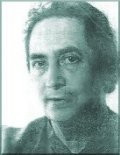|
Recha Freier (1892 - 1984)
or the dream to save 10.000 children
 Erdbeben: Earthquake Erdbeben: Earthquake
Der Stadtgarten /The city garden
Das goldglänzende Gitter / The gold shimmering gate
geschlossen / closed
ein großes weißes Pappschild / a big white cardboard sign
Ein Rahmen aus schwarzem Papier / a frame of black paper
Eintritt für Hunde / Admission prohibited
und Juden verboten! / for dogs and Jews!Recha Freier described with these lines the feelings and
experiences of anti-Semitism during her first four years of life. PRIVATE
She was born in 1892 in Norden/Ostfriesland. She grew up in a little town in
Silesia. Because of the prohibition to write on Shabbat, she was constantly
humilated at school and tormented by her teacher, who asked if she could
even tie the ribbon of her pinafore on a Saturday. Gifted for music and
poetry, she studied new languages at the University of Breslau and worked
later as a teacher and pianist. 1919 she married rabbi Moritz Freier and
moved with her husband until 1926 to Sofia/Bulgaria. Then her husband was
called as chief rabbi to Berlin. Recha Freier kept herself busy researching
children’s tales and refused to be defined through her husbands profession.
1932 five 16 year old boys of Eastern Jewish background came to her to
inquire for her assistance. The five boys had been sacked. Unlike the Jewish
employment office, she didn’t see the incidence as an economic and social
problem, but rather as a case of anti-Semitic action. One night she came up
with a solution: to bring youngsters to Palestine to evolve their
personality and to help build up the country.
She encountered resistance from all sides: from Zionist
organisations, because only high quality professionals were supposedly
needed in Palestine; from parents and Jewish communities, who believed that
the situation wasn’t that bad. On 30th of January 1933, the day of Hitler’s
ascent to power, Recha Freier inscribes the "Support committee for Jewish
Youth" ( Hilfsverein) officially at a lawyers office.
She was submerged to a daily onslaught of crises,
agitation, intrigues. Money and documents for trips to Palestine had to be
procured. The Youngsters had be selected and prepared for life in an
agricultural setting. During this time she travelled a lot between Berlin
and Palestine, to build up contacts and to search for financing. As the
first group of 6 teenagers started out, the train station at Anhalter
Bahnhof was packed with people.
Her methods were controversial. She was not afraid of
working in a legal grey zone. For instance she procured passages with
shipping companies, stipulating that she had the needed documents for
immigration. At the Palestine office, she threatened with the tickets and
that she now needed the documents, otherwise there would be a scandal.
1938 she is being expelled from the board of the Jewish Youth Support
Committee (juedische Jugendhilfe), since the other members of the directory
board didn’t want to arrange themselves with her illegal methods. During the
night of the Pogrom, Recha was with her family in London. But she came back
immediately once she heard what happened, to continue her activities on her
own. She was denounced by colleagues for anti-Nazi agitation. Since she was
warned on time, she managed to flee to Palestine and take 40 teenagers with
her. Her whole life she, who had saved more than 7600 children from Nazi
Germany, suffered that she had not been able to save more. 1958 she
established a centre for the education of children and the foundation
„Testimonium" to support Jewish musicians.
The Youth Aliyah, the immigration movement for orphaned
children, that she founded, now helps those who come into the country on
their own with the different immigration waves. 1954 – by now children from
72 different countries have immigrated on their own to Israel – Albert
Einstein suggests her for the peace Nobel prize. But in vain. Recha Freier
died 1984 in Jerusalem.
Ankunft Arrival
Dunkler in den Augen. / Dunkel in Darkness in the eyes
den Augen.
Kein Himmel./ No sky
Dunkel. / Darkness
Ich lag in dem weichen, feuchten Sand / I lied in the soft, humid sand
und schlief ein. / and felt asleep
Ich erwachte / I woke up
und weinte / and cried
und schlief ein./ and felt asleep
Ich weinte im Schlaf / I cried in my sleep
und erwachte./ and woke up
Ich erschrak und weinte -/ I was frightened and
und schlief ein. / cried and felt asleep
Und weinte und schlief / And cried and slept
ich schlief / I slept
ich schlief / I slept
schlief / slept
(Both poems stem from the book „auf der Treppe" – English translation
provided by hagalil)
hagalil.com
16-12-02
•
Events in
Berlin
•
Synagogues and
Services
•
Important Addresses in Berlin
•
Kosher in Berlin
•
Berlin Rabbis
•
Jewish Groups in Berlin
•
Guided Tours
about Jewish Life and History
•
Jewish Women's Activities
•
Searching for Your Berlin Roots?
•
Historical Background
•
The Jewish Museum of Berlin
•
Memorials in Berlin
•
German Content |